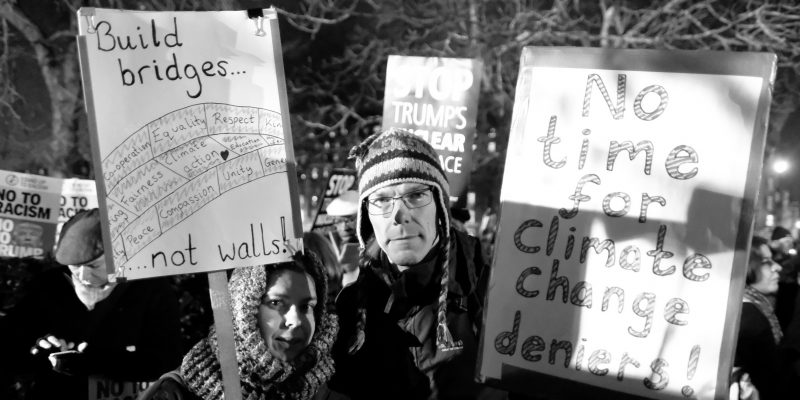Trump Seems Confused on Climate Threat to U.S. Security
His new national defense strategy shows contradictions in his administration's take on the risks posed by climate change. A London protest against Donald Trump. (Alisdare Hickson / Wikimedia Commons)
A London protest against Donald Trump. (Alisdare Hickson / Wikimedia Commons)
Confused about climate’s security threat? Don’t worry – you’re not the only one. Donald Trump seems to be having great difficulty in knowing what to make of it too.
He’s even explicitly contradicted a senior colleague – and himself. And he’s prompted suggestions from retired military officers that America’s armed forces will continue to prepare for the reality of climate change undeterred.
The Trump administration has dropped climate change from a list of global threats in a new National Security Strategy the president has launched.
Instead, President Trump’s NSS emphasises the need for the US to regain its economic competitiveness in the world, with his “America First” plan focussing on four themes surrounding economic security for the US.
The Associated Press lists them as “protecting the homeland and way of life; promoting American prosperity; demonstrating peace through strength; and advancing American influence in an ever-competitive world”.
“Climate change is not identified as a national security threat, but climate and the importance of the environment and environmental stewardship are discussed,” a senior administration official told the London Guardian. Last June the president announced his intention to withdraw the US from the Paris Agreement on climate change.
By contrast, former President Obama said that “climate change constitutes a serious threat to global security, an immediate risk to our national security. And make no mistake, it will impact how our military defends our country.”
The new doctrine is hard to reconcile with a statement by a man Mr Trump himself appointed to high office, the US Defense Secretary, Jim Mattis, who said in March that climate change was affecting stability in parts of the world where American troops were operating, and that it was appropriate for commanders to plan for the instability it would cause.
The US Government Accountability Office said recently that military authorities are neglecting to plan for climate risks. A GAO study team said that of 45 military installations worldwide, only a third had integrated climate change adaptation into their planning.
Dozens of bases were exempted from a department-wide climate vulnerability assessment, including “key national security sites.” The report said the Pentagon omitted a number of facilities without adequate explanation – in some cases it simply stated that there was no risk, but gave no reasons.
But the starkest contrast between the new strategy and the past appears to be the work of Donald Trump himself. On 12 December he signed into law the National Defense Authorization Act. Its provisions include requiring the Pentagon to report on how military installations and overseas staff may be vulnerable to climate change over the next two decades.
To make sure that nobody missed the point, the act stated explicitly: “Climate change is a direct threat to the national security of the United States.” But the president who signed that act now, one week later, thinks climate change is not a security threat worth the name.
The Center for Climate & Security (CCS) is a US non-partisan policy institute of security and military experts (many of them high-ranking former members of the armed forces). It regards the threats of climate change and nuclear conflict as inseparably joined.
The co-founder and president of the CCS, Francesco Femia, told the Climate News Network: “It’s very unfortunate that climate change is not being explicitly addressed as a national security threat in the National Security Strategy . . .
“However, despite this strategy, which is more of a political document than anything else, I think the broader national security community in the US will continue to prepare for this challenge, as was made clear by the defense bill, and as has been made clear by the Department of Defense.
“We have a responsibility to prepare, and that’s becoming clearer every day.”
Your support matters…Independent journalism is under threat and overshadowed by heavily funded mainstream media.
You can help level the playing field. Become a member.
Your tax-deductible contribution keeps us digging beneath the headlines to give you thought-provoking, investigative reporting and analysis that unearths what's really happening- without compromise.
Give today to support our courageous, independent journalists.






You need to be a supporter to comment.
There are currently no responses to this article.
Be the first to respond.